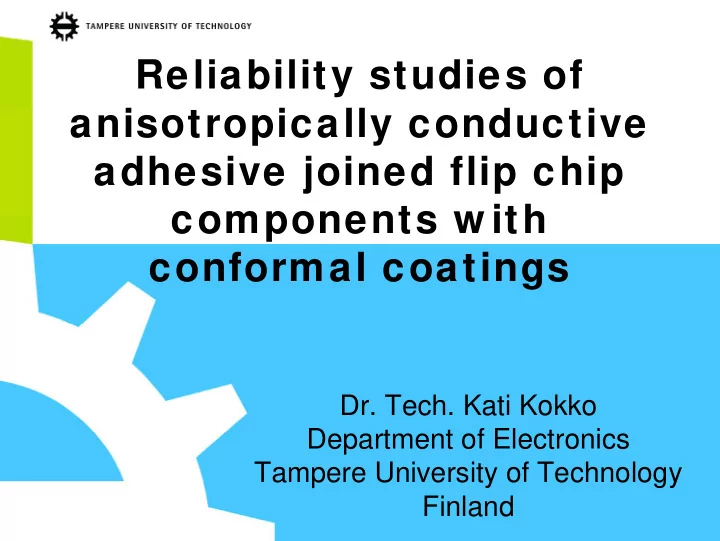

Reliability studies of anisotropically conductive adhesive joined flip chip components w ith conformal coatings Dr. Tech. Kati Kokko Department of Electronics Tampere University of Technology Finland
Outline • Our test setup • Flip chip technology • Coating materials and structures • Reliability testing • Results and discussion Kati Kokko 19.12.2012 2
Our test setup • FR-4 substrate with anisotropically conductive film (ACF) joined flip chip • Polyimide substrate with ACF joined flip chip • Protective coating – Epoxy – Parylene C – Epoxy-Parylene C • Reliability testing – 8585 –testing – -40/+85 thermal cycling • Failure analysis Kati Kokko 19.12.2012 3
Flip chip technology • Flip chip joining is made face down • Solder joining • Adhesive joining – NCA (non-conductive adhesives) – ICA (isotropically conductive adhesives) – ACA (anisotropically conductive adhesives) http://www.engr.sjsu.edu/WofMatE/Semiconductor s.htm Kati Kokko 19.12.2012 4
5 19.12.2012 ACF joining of flip chips Kati Kokko
Coating materials used • Epoxy • Parylene C • Epoxy – Parylene C sandwich Kati Kokko 19.12.2012 6
Test chip structure • Test chips used in the studies were specially designed for testing • Daisy chain resistance was measured during testing • Real time measurements were used to better detect the behaviour of the samples during testing Kati Kokko 19.12.2012 7
Reliability testing • 85/85 –testing – 85 % relative humidity – 85 ° C • One test period 500h • Total durance 7,000h Liu, Salmela, Särkkä, Morris, Tegehall, Anderson: Reliability in Microtechnology: Interconnect, Devices and Systems • Flip chips on FR-4 • Test lots • without coating • Epoxy coating • Parylene C coating • Epoxy – parylene C sandwich Kati Kokko 19.12.2012 8
Reliability testing • Thermal cycling test • -40/+85 °C • Duration of a cycle 30min • Test lasted 6,000 cycles • Flip chips on FR-4 and polyimide substrates • Half of the test lots were coated with parylene C Kati Kokko 19.12.2012 9
10 Reliability results from 8585 19.12.2012 Kati Kokko testing
Reliability results from -40/+85 cycling • Test lots with polyimide substrate did not have any failures during 6,000 cycles Kati Kokko 19.12.2012 11
12 19.12.2012 Daisy chain resistance Kati Kokko measurements
13 19.12.2012 Daisy chain resistance Kati Kokko measurements
14 19.12.2012 Daisy chain resistance Kati Kokko measurements
Failure analysis, 8585 test A sample from Parylene C coated test lot A sample from non-coated test lot Kati Kokko 19.12.2012 15
Failure analysis, -40/+85 cycling A sample from non-coated test lot A sample from Parylene C coated test lot Kati Kokko 19.12.2012 16
17 19.12.2012 Polyimide substrate Kati Kokko -40/+85 cycling,
Conclusion • Reliability studies in 8585 constant humidity test and - 40/+85 thermal cycling test were conducted • The test specimen had ACF joined flip chips on FR-4 and PI substrates • Epoxy, Parylene C and Epoxy-Parylene C sandwich structures were studied as protective coatings • Reliability results show long durability against humid environments and thermal cycling • Parylene C proved to be the best alternative for protective coating from the tested materials in humid environments • In thermal cycling the protective coating did not have much effect to the reliability • Failure analysis showed delamination as the main cause for failures Kati Kokko 19.12.2012 18
19 19.12.2012 Further information: kati.kokko@tut.fi THANK YOU! Kati Kokko
Recommend
More recommend